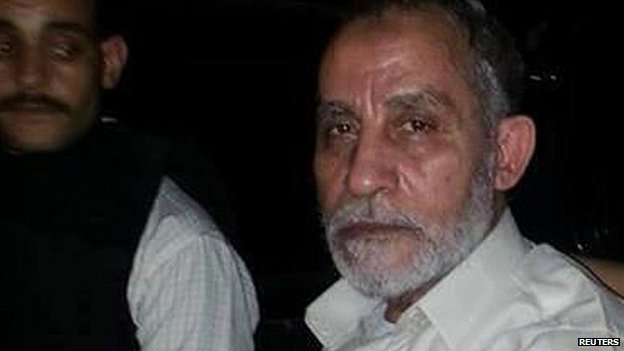An Egyptian military court Tuesday sentenced Muslim Brotherhood leader Mohammad Badie to 10 years in prison over deadly clashes following the 2013 ouster of president Mohammad Mursi.
 An Egyptian military court Tuesday sentenced Muslim Brotherhood leader Mohammad Badie to 10 years in prison over deadly clashes following the 2013 ouster of president Mohammad Mursi, judicial officials said.
An Egyptian military court Tuesday sentenced Muslim Brotherhood leader Mohammad Badie to 10 years in prison over deadly clashes following the 2013 ouster of president Mohammad Mursi, judicial officials said.
Ninety other defendants who were tried in absentia were sentenced to life terms, which in Egypt means 25 years.
Badie and dozens of others were found guilty of participating in clashes that killed 31 people in the canal city of Suez between August 14 and 16, 2013.
The clashes erupted after police broke up two pro-Mursi protest camps in Cairo on August 14 that year.
The charges in the military trial included vandalism, inciting violence, murder, assaulting military personnel and setting fire to armored personnel carriers and two Coptic churches in Suez.
Badie, the Brotherhood's spiritual guide, was sentenced to 10 years along with fellow Brotherhood leader Mohammad Beltagy and Safwat Hegazy, a pro-Brotherhood army and judicial officials said.
Forty-one defendants were sentenced to serve between three and seven years, 90 others were handed down life sentences and 59 others were acquitted.
Tuesday's sentences can be appealed.
Badie is facing several trials and has been sentenced to death in a separate case along with Mursi for plotting jailbreaks and attacks on police during the 2011 uprising that ousted president Hosni Mubarak.
The Brotherhood chief has also been handed life sentences in five other cases.
Hundreds of Mursi supporters were killed on August 14, 2013 when police stormed their camps in Cairo, just weeks after the elected president was ousted by then army chief and now President Abdel Fattah al-Sisi.
Military tribunals in Egypt have faced criticism for their harsh and swift verdicts.
Egypt's constitution allows military trials of civilians accused of violence against military targets -- which include public infrastructure such as highways and bridges as well as universities.